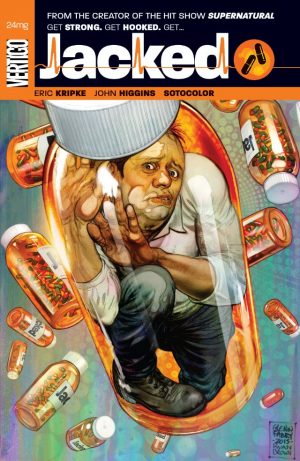Review: Jacked Vol. 1
High concept is one of the quickest wells to go to for story creation. "What would happen if...." is easy and it works. It gives you a hook right out the bat for your story, prepackaging your elevator pitch into the very first act of writing. It also can help with ensuring what you come up with hasn't been done before, as the whole goal with high concept is smashing ideas that already exist together to create something new, familiar enough to connect with your audience, but crazy enough to get them in the door. What if you went back in time and met your parents before they dated? What if superheroes were real but didn't have superpowers? Flashy, dramatic, marketable.
The problem with high-concept is the story almost always starts from the pitch and develops characters to fit the idea later. Another problem is said character often has to be a pretty generic every-man, relatable and broad enough that the audience can live the wacky drama hijinks through them, interrogating themselves on how they think they'd handle the situation. It's not to say characters in high-concept fiction are always mostly forgettable, but even in great films it usually takes till the sequel to give their character definition away from simply being a placeholder avatar for the action that revolves around them. Sarah Connor from The Terminator to T2. Luke from New Hope to Empire. While by no means a maxim to navigate by, the harder it is to describe your central premise, the richer the characters will have to be since they will be doing the heavy lifting for the story.
 If I had to hazard a guess as to when Jacked was written and illustrated, I'd have to say the very late 90's to very early 2000's. In reality, this book came out between this and last year. This isn't a dig, as I didn't hate Jacked, but it does serve as an example of when leaning on a stale high-concept pitch can weaken the legs on your story to near collapse. In Jacked, a generic sad sack recently unemployed middle-aged white male is recommended a pill that gives him very basic superpowers. Where do you think the story goes from there? Chances are, you nailed it, because you've heard this one before. His kid suddenly respects him, his wife is happy to fuck him again, and he gets to thumb his nose at the beefy jock who constantly emasculates him. Then he gets in over his head with 'only in the movies' drug dealers and has to fight to survive. It's Kick Ass, Limitless, and Fight Club all rolled up into one very, very familiar package about 10 to 15 years too late.
If I had to hazard a guess as to when Jacked was written and illustrated, I'd have to say the very late 90's to very early 2000's. In reality, this book came out between this and last year. This isn't a dig, as I didn't hate Jacked, but it does serve as an example of when leaning on a stale high-concept pitch can weaken the legs on your story to near collapse. In Jacked, a generic sad sack recently unemployed middle-aged white male is recommended a pill that gives him very basic superpowers. Where do you think the story goes from there? Chances are, you nailed it, because you've heard this one before. His kid suddenly respects him, his wife is happy to fuck him again, and he gets to thumb his nose at the beefy jock who constantly emasculates him. Then he gets in over his head with 'only in the movies' drug dealers and has to fight to survive. It's Kick Ass, Limitless, and Fight Club all rolled up into one very, very familiar package about 10 to 15 years too late.
But it doesn't really suck. The story is simple but comprehensible and with little moments of faint creativity that made it pretty readable. The art is old-fashioned feeling, feeling very turn of the millennium from the inking to the color work, but very much in a good way as it is the standout part of the book, detailed, gory, and energetic. Superficially, the book's sense of humor is pretty weak, a lot of fill in the blank apathetic white male neurotic self-pity and try-hard attempts to be Ennis edgy. If anything, I'm actually surprised I didn't mind it as much as I did, looking back.
But the overwhelming weakness in the end is that Jacked is a good example of a pretty quality piece of comic work that is undercut by prioritizing a high-concept over characters with complexity or a story we could really invest in. You know how this ends. Kick Ass and the first arc of Luther Strode told the same story, and with more panache. The sole interesting idea comes when we have an issue that changes the narration from our protagonist to his emotionally estranged wife, mirroring a lot of his internal doubts and frustrations with her own, a surprisingly humane touch most stories of this nature never think to include, often using the wife simply as a barometer of masculine success. Almost as soon as this idea is introduced however, it unceremoniously disappears, back to the vaguely Millar/Ennis soup of graphic violence and pseudo-graphic sexual deviancy.
Overall, I won't remember Jacked at the end of the year but didn't hate reading it. It's a quality production from a professional standpoint, and to read something with artwork that doesn't look like a teenagers DeviantArt gallery was somewhat refreshing. You could do worse. The problem is, with so much else out there, so many stories with memorable humanized characters, witty comedy, and explorative storytelling I couldn't see why you'd want to settle for less.
[su_box title="Score: 3/5" style="glass" box_color="#8955ab" radius="6"]
[/su_box]
